Imagine a world where every puppy is confident, well-behaved, and adaptable to any situation. A world where your furry friend can walk calmly down the street, interact positively with other people and animals, and truly thrive in any environment. This is not just a dream - it can become a reality through the power of puppy socialization. In this comprehensive guide, you will learn why puppy socialization is crucial and how to go about it effectively. So get ready to unlock the secrets of raising a well-rounded and socially-savvy pup that will bring joy and happiness into your life for years to come.
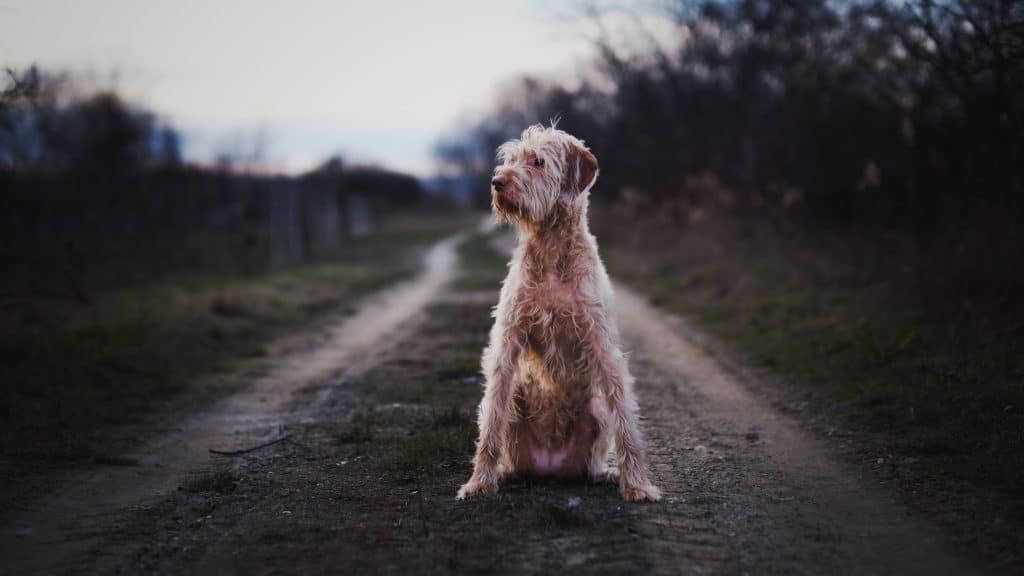
This image is property of images.pexels.com.
What is puppy socialization?
Definition
Puppy socialization refers to the process of exposing young puppies to various experiences, environments, people, and animals in order to help them develop into well-rounded, confident, and socially adept dogs. It involves providing positive and controlled interactions that allow puppies to learn how to navigate the world around them.
Importance of early socialization
Early socialization is crucial for puppies as it lays the foundation for their future behavior and temperament. During the critical socialization period, which is typically between 3 and 14 weeks of age, puppies are more receptive to new experiences and less likely to develop fears or phobias. Without proper socialization, they may grow up to be fearful, anxious, or aggressive dogs, making it challenging for them to adapt to different situations and interact with others.
Stages of puppy socialization
Puppy socialization can be divided into several stages, each with its own set of goals and experiences. The first stage, which starts as early as 3 weeks old, focuses on familiarizing puppies with their littermates, mother, and gentle handling by humans. The second stage, around 4 to 8 weeks, involves gradually introducing puppies to new environments, sounds, and smells. The third stage, from 8 to 14 weeks, is critical for exposure to a wide range of people, animals, and situations. Continued socialization efforts beyond 14 weeks help solidify their skills and ensure they are comfortable in various scenarios.
Benefits of puppy socialization
Promotes positive behavior
Proper puppy socialization promotes positive behavior and helps prevent behavior problems such as aggression, fear, and anxiety. By gently exposing puppies to different stimuli and rewarding their calm and appropriate responses, they learn how to navigate the world with confidence and respond positively to new experiences.
Reduces fear and aggression
Early socialization plays a crucial role in reducing fear and aggression in puppies. By gradually introducing them to various people, animals, and environments, puppies learn that new situations are not threats but opportunities for positive experiences. Through positive reinforcement and gradual exposure, puppies can become more confident and less likely to develop fear-based aggression.
Builds confidence and resilience
Socializing puppies helps build their confidence and resilience, allowing them to face new challenges with ease. Controlled exposure to different environments, sounds, and situations helps puppies develop coping mechanisms and adaptability, leading to more emotionally stable adult dogs.
Enhances learning ability
Puppy socialization enhances their learning ability by creating a solid foundation for future training and education. Socialized puppies develop better focus, attention, and engagement, making them more receptive to learning new commands and skills. Their exposure to various people, animals, and environments also helps them generalize their learned behaviors and adapt to different training scenarios.

This image is property of images.pexels.com.
When should puppy socialization begin?
Critical period for socialization
The critical period for puppy socialization starts as early as 3 weeks old and generally lasts until around 14 weeks old. During this time, puppies are highly receptive to new experiences and are more likely to accept and adapt to unfamiliar stimuli. However, it's important to note that socialization efforts should continue beyond this period to ensure long-term success.
Recommended age to start
Ideally, puppy socialization should start as soon as you bring your puppy home, around 8 weeks of age. This allows for a smooth transition from their littermates and mother to their new environment and experiences. Early socialization sets the stage for future social interactions and helps prevent the development of fear and anxiety-related issues.
Considerations for rescue puppies
Rescue puppies may have missed out on crucial socialization experiences during their early weeks of life, making it even more important to prioritize their socialization efforts. These puppies may require additional patience, understanding, and gradual exposure to new experiences. It's essential to consult with a professional trainer or behaviorist when working with rescue puppies to ensure their unique needs are met.
How to socialize your puppy
Exposure to new environments
Expose your puppy to a variety of new environments to help them adjust and become comfortable in different surroundings. Start with quiet areas and gradually increase the level of stimuli, such as traffic noise or crowded places. Ensure the environments are safe and free from potential hazards.
Introduce to a variety of people
Introduce your puppy to various people of different ages, genders, and appearances. Encourage positive interactions by having people offer treats, play gently, and speak in soothing tones. This helps puppies develop positive associations with different types of individuals and builds their confidence in social settings.
Interaction with other animals
Provide opportunities for your puppy to interact with other well-socialized dogs and animals. Arrange playdates with friendly and balanced dogs and supervise their interactions to ensure they remain positive and safe. Appropriate socialization with other animals helps puppies understand body language, develop good social skills, and build healthy relationships.
Desensitization to common stimuli
Gradually expose your puppy to common stimuli they may encounter in daily life, such as vacuum cleaners, doorbells, or loud noises. Start with low-intensity exposure and gradually increase the level of stimuli while observing your puppy's response. Reward calm and relaxed behavior to help them associate such stimuli with positive experiences.
Handling and grooming exercises
Get your puppy accustomed to being handled and groomed from an early age. Touch their paws, ears, mouth, and body gently, and reward them for staying calm and relaxed during these exercises. This will make vet visits, grooming sessions, and routine care less stressful for both you and your puppy.
Positive reinforcement training
Incorporate positive reinforcement training into your puppy's socialization process. Reward desired behaviors with treats, praise, and play, while redirecting or ignoring unwanted behaviors. This will help your puppy understand what is expected of them and strengthen the bond between you and your furry friend.
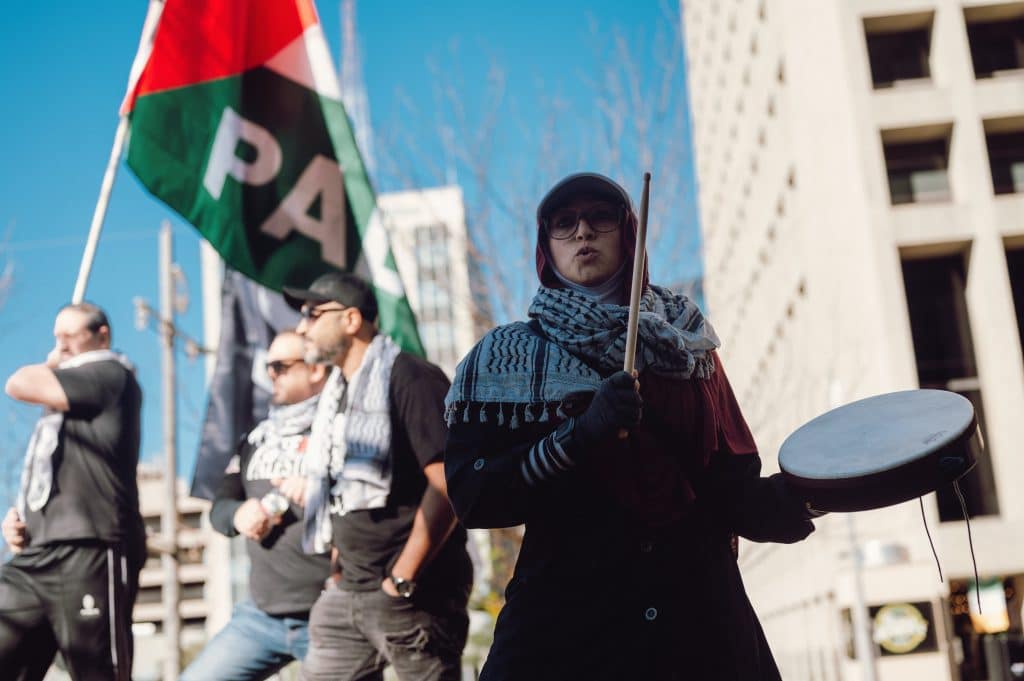
This image is property of images.pexels.com.
Socializing puppies during a pandemic
Challenges of socializing during a pandemic
The COVID-19 pandemic has posed challenges for socializing puppies, as restrictions on social gatherings and limited access to public spaces have made it difficult to expose puppies to new experiences. Lack of socialization during this crucial period could lead to behavioral issues down the line.
Creative solutions for socialization
While traditional methods of socialization may be limited during a pandemic, there are still creative solutions to ensure your puppy receives proper socialization. Take advantage of outdoor spaces where social distancing is possible, invite friends with well-socialized dogs for controlled playdates, or set up virtual meet-ups to expose your puppy to different faces and voices.
Virtual puppy classes and online resources
Many trainers and organizations have adapted to the pandemic by offering virtual puppy classes and online resources. These classes provide guidance on socialization exercises, training techniques, and behavior management, allowing you to continue your puppy's socialization journey from the comfort of your home.
Socializing puppies with other dogs
Choosing appropriate playmates
When socializing puppies with other dogs, it's important to choose appropriate playmates. Look for well-socialized dogs with a calm demeanor and good communication skills. Avoid placing your puppy in situations where they may be overwhelmed or exposed to aggressive or poorly behaved dogs.
Supervised play sessions
Ensure play sessions between your puppy and other dogs are supervised. Observe their interactions closely, ensuring that they are engaging in healthy play behaviors such as taking turns, respecting each other's boundaries, and displaying loose and relaxed body language. Step in if any aggressive or overly rough behaviors occur.
Dog parks and group classes
Dog parks and group training classes can provide excellent opportunities for your puppy to socialize with other dogs in a controlled environment. However, it's important to choose reputable and well-managed locations to ensure the safety and well-being of your puppy. Follow all park rules and guidelines and keep a close eye on your dog's interactions.
Signs of healthy dog play
Healthy dog play includes behaviors such as loose and wagging tails, play bows, taking turns as the chaser and the chasee, and soft and bouncy movements. Pay attention to the overall body language of both dogs during play and intervene if you notice any signs of discomfort, fear, or aggression.
Intervening in unwanted behaviors
If you encounter unwanted behaviors, such as excessive roughness or mounting, intervene calmly and redirect the dogs' attention to an appropriate behavior. It's important to prevent any negative experiences from occurring during socialization, as they can have long-lasting effects on your puppy's behavior and perception of other dogs.
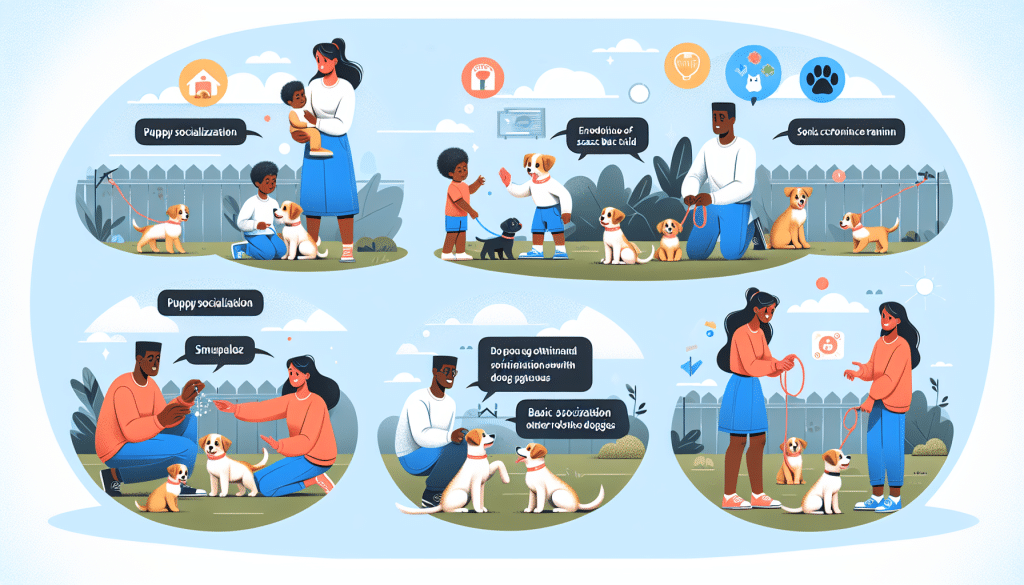
Socializing puppies with people
Exposing to various ages and genders
When socializing your puppy with people, expose them to individuals of various ages, genders, and appearances. This helps your puppy learn to feel comfortable and relaxed around different kinds of people, reducing the risk of fear or aggression in certain situations.
Introducing different handling techniques
Introduce your puppy to various handling techniques to ensure they are comfortable with being touched and handled by different people. This includes gently stroking their body, touching their paws, examining their ears, and gently opening their mouth. Reward your puppy for remaining calm and relaxed during these exercises.
Encouraging positive interactions
Encourage positive interactions between your puppy and people by using treats, praise, and play as rewards. This helps your puppy associate people with positive experiences and builds their confidence in various social settings.
Preventing fear and aggression
To prevent fear and aggression towards people, avoid forcing your puppy into uncomfortable situations or allowing negative interactions. If your puppy shows signs of fear or discomfort, create distance and gradually reintroduce the situation at a pace they can handle. Seek professional help if fear or aggression behaviors persist.
Professional help for fear and anxiety
If your puppy exhibits excessive fear or anxiety, or if you encounter adverse behaviors during socialization, it is important to seek professional help. A certified dog trainer or behaviorist can provide guidance, develop behavior modification plans, and help address any underlying issues contributing to fear or anxiety.
Socializing puppies with children
Teaching children appropriate interactions
Teaching children appropriate interactions with puppies is crucial to ensure the safety and well-being of both the child and the dog. Educate children about gentle handling, proper petting techniques, and the importance of respecting a dog's personal space. Help them understand that puppies have boundaries and may not enjoy certain types of interactions.
Supervision and safety tips
Always supervise interactions between your puppy and children to prevent any unintentional harm or stress. Keep both the puppy and the child safe by ensuring the child does not engage in rough play or handle the puppy inappropriately. Teach children to recognize signs of fear or discomfort in puppies and to give them space when needed.
Common challenges and solutions
Some common challenges when socializing puppies with children include overexcitement, inappropriate handling, and excessive rough play. Set clear boundaries and expectations for both the puppy and the child. Use positive reinforcement to reward calm and appropriate interactions and redirect or remove the puppy from the situation if needed.
Building a strong bond
Proper socialization between puppies and children can help build a strong bond and create positive experiences for both. Encourage children to participate in training exercises, feeding, and care routines, allowing them to develop a sense of responsibility and empathy towards the puppy. This helps foster a lasting and mutually beneficial relationship.
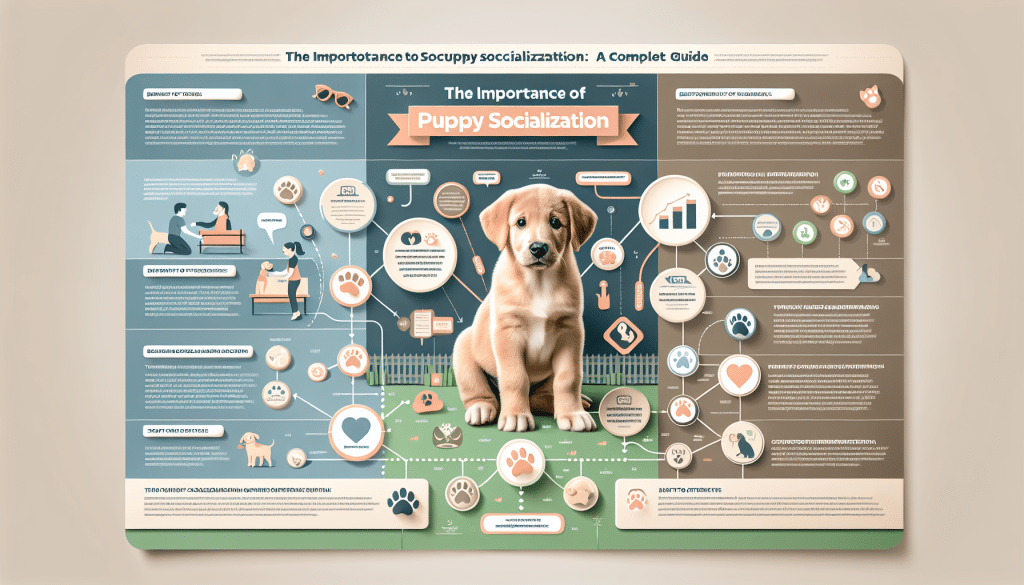
Addressing fear and aggression
Recognizing signs of fear and aggression
It's important to recognize the signs of fear and aggression in puppies during socialization. Signs of fear may include cowering, hiding, trembling, or attempting to escape. Signs of aggression can manifest as growling, snarling, snapping, or lunging. These behaviors indicate that your puppy may not feel comfortable or safe in the current situation.
Counter-conditioning and desensitization
Counter-conditioning and desensitization techniques can help address fear and aggression in puppies. By gradually exposing your puppy to the trigger that causes fear or aggression while providing positive experiences and rewards, you can help change their emotional response. Seek professional guidance to create a behavior modification plan tailored to your puppy's specific needs.
Seeking professional behavior help
If your puppy displays persistent fear or aggression behaviors that you are unable to address on your own, it is important to seek professional behavior help. A certified dog trainer or behaviorist can assess the situation, identify the underlying causes, and provide a personalized plan to address and manage fear or aggression issues.
Maintaining socialization beyond puppyhood
Continuing socialization efforts
Socialization should be an ongoing process beyond puppyhood to ensure your dog remains well-adjusted and socially adept. Continue exposing your dog to new environments, varying stimuli, and positive social interactions throughout their life. Regular socialization helps prevent regression and ensures your dog remains confident and adaptable in different situations.
Joining obedience or training classes
Joining obedience or training classes can provide great opportunities for socialization in a controlled environment. These classes not only teach your dog essential skills, but they also expose them to other dogs and people, helping to reinforce positive social interactions and build their confidence.
Regular exposure to different environments
Continue exposing your dog to different environments to maintain their adaptability. Take them on walks in new neighborhoods, visit pet-friendly stores, or plan outdoor outings to expose them to various sights, sounds, and smells. This helps prevent them from becoming overly sensitive or anxious in unfamiliar situations.
Socialization for adult rescue dogs
Adult rescue dogs may have missed out on early socialization experiences, making it important to continue their socialization efforts. Gradual exposure to new experiences, people, and animals can help them overcome fears and build positive associations. Seek guidance from a professional to help assess their unique needs and develop a socialization plan.
In conclusion, puppy socialization is a critical aspect of raising a well-rounded and emotionally stable dog. Starting early and providing gradual exposure to a variety of experiences, people, and animals helps puppies develop positive behaviors, reduces the risk of fear and aggression, builds confidence, enhances learning ability, and sets a solid foundation for a lifetime of positive interactions. Remember to seek professional guidance when needed, prioritize positive reinforcement, and continue socialization efforts throughout your dog's life to ensure long-term success.

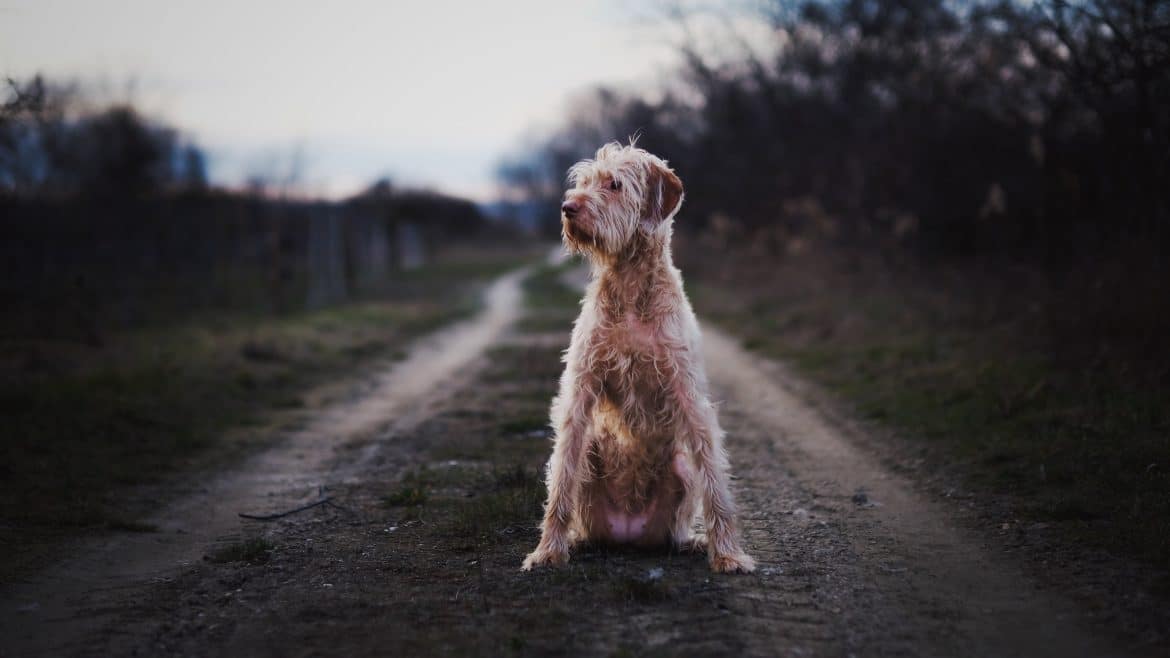

3 comments
[…] overall health, and can even prevent common health issues. In this article, we will discuss the importance of nutrition plans for puppies and provide you with valuable information on how to create a balanced nutrition plan that suits […]
[…] your new dog to different people and animals is an important part of socialization. Start with positive experiences by introducing them to friends, family members, and neighbors who […]
[…] using these types of signals during playtime, dogs can learn important social cues and boundaries that will help them interact more effectively with other dogs in the […]
Comments are closed.